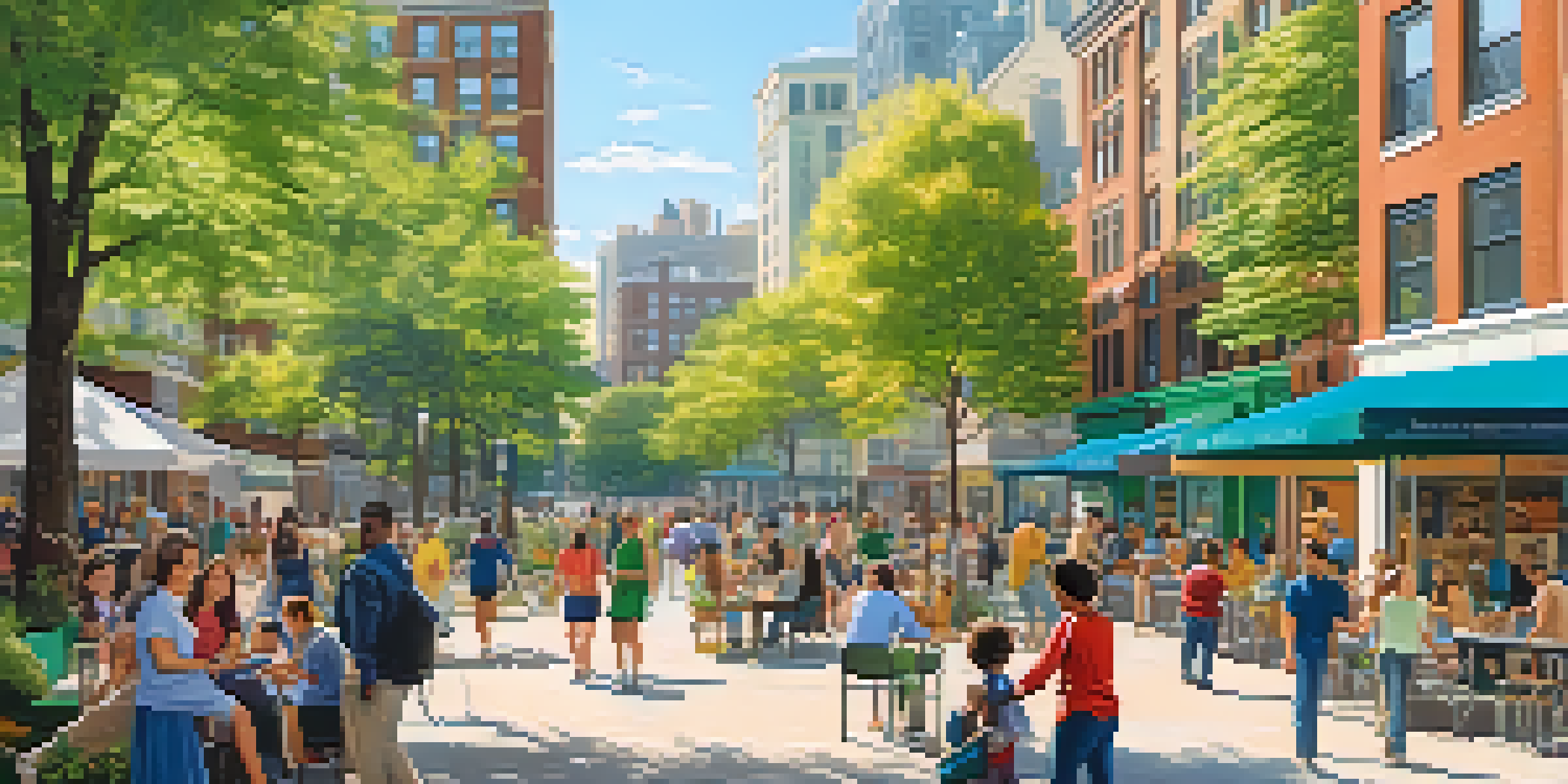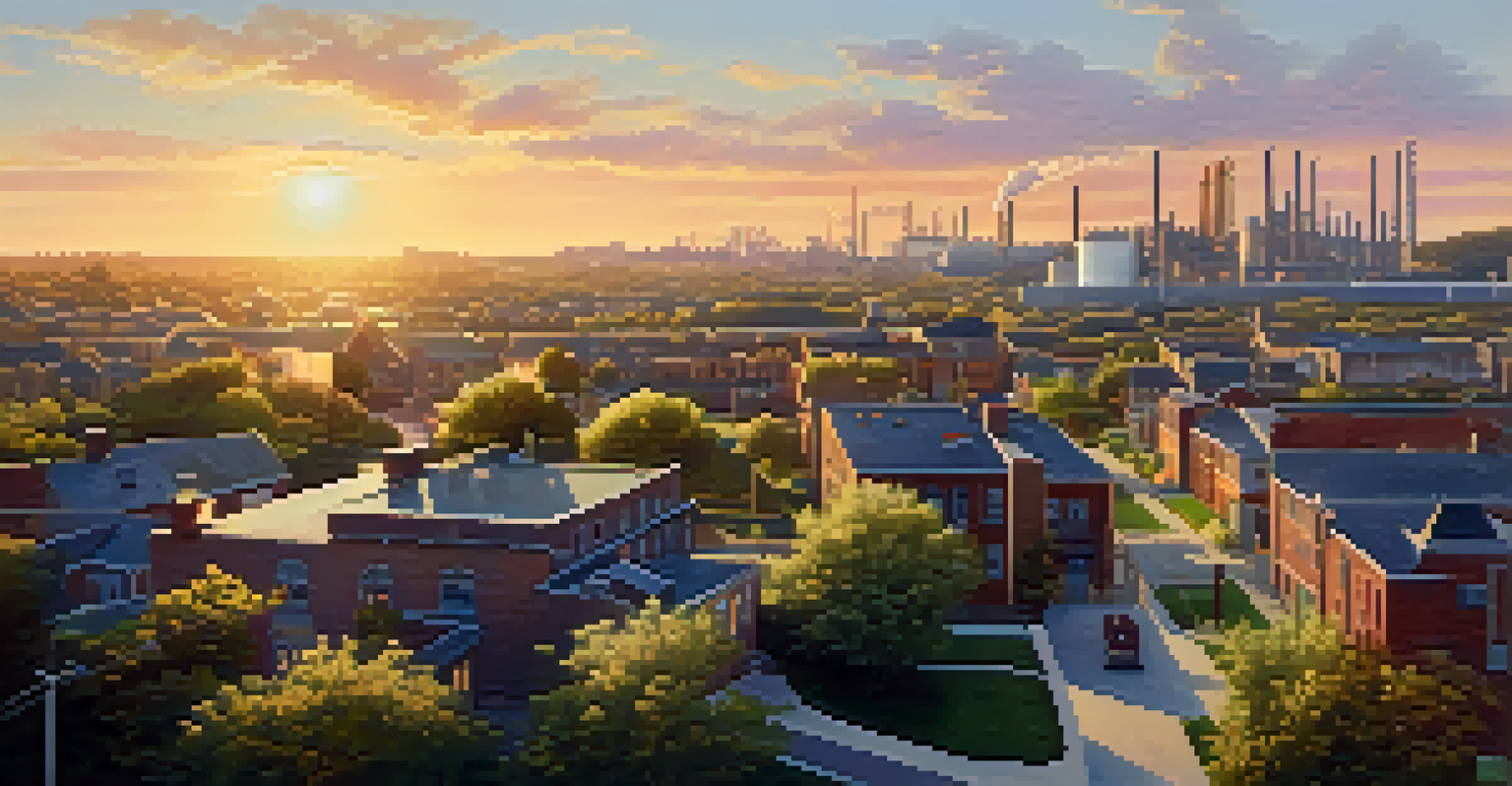The Importance of Zoning Laws in Urban Development

What Are Zoning Laws and Their Purpose?
Zoning laws are regulations that dictate how land can be used in specific areas. They help organize urban development by designating zones for residential, commercial, industrial, and agricultural use. By establishing these guidelines, cities ensure that different types of land use don’t conflict with one another, creating a more harmonious environment.
Zoning is not a four-letter word. It is a tool to help us build better communities.
For instance, zoning laws prevent factories from being built in the middle of residential neighborhoods, which could lead to noise and safety issues. This not only protects residents but also maintains property values and promotes community well-being. As cities grow, these laws play a crucial role in managing the balance between development and livability.
In essence, zoning laws serve as a framework for urban planning. They guide what can be built where and help to create a coherent and functional urban landscape. Without these regulations, chaos could ensue, leading to incompatible land uses and a decline in quality of life.
The Impact of Zoning Laws on Community Growth
Zoning laws significantly influence how communities grow and develop over time. They help shape the character of neighborhoods by determining the types of buildings allowed and how densely they can be constructed. This can affect everything from traffic patterns to the availability of green spaces, ultimately influencing residents' quality of life.

For example, areas designated for multi-family housing can accommodate more people and potentially lower housing costs. Conversely, zoning that favors single-family homes may lead to less density and higher property values. By understanding these dynamics, communities can strategize their growth to meet the needs of their populations.
Zoning Laws Shape Urban Development
Zoning laws regulate land use to create organized and functional urban environments, preventing conflicts between different types of development.
Moreover, zoning laws can promote sustainable development practices. By encouraging mixed-use developments, cities can create vibrant neighborhoods where people can live, work, and play—all within walking distance. This not only enhances community interaction but also reduces reliance on cars, contributing to environmental sustainability.
Zoning Laws and Economic Development
Zoning laws are key players in economic development, as they can attract or deter businesses from setting up shop in a city. By designating specific areas for commercial use, cities can create business districts that thrive and contribute to local economies. This thoughtful planning can lead to job creation and increased tax revenue.
Good zoning is the foundation of good planning. It helps shape the future of our communities.
For instance, a city may zone an area for technology companies, fostering an innovation hub that brings in talent and investment. On the flip side, overly restrictive zoning can stifle economic growth and push businesses to relocate to more favorable environments. Thus, finding the right balance is essential.
Additionally, zoning can influence the types of businesses that flourish in a community. By allowing certain industries to thrive, cities can diversify their economic base and mitigate risks associated with economic downturns. This proactive approach not only supports local entrepreneurs but also enhances overall community resilience.
Balancing Development and Environmental Concerns
One of the critical roles of zoning laws is to balance urban development with environmental protection. By enforcing regulations that limit development in sensitive areas, such as wetlands or floodplains, cities can help preserve natural habitats and protect ecosystems. This is increasingly important as urban areas expand and climate change poses new challenges.
For example, zoning can restrict construction near rivers, reducing the risk of flooding while safeguarding wildlife habitats. Additionally, zoning can promote green spaces, encouraging parks and recreational areas that benefit residents and the environment alike. This holistic approach to zoning reflects a growing awareness of environmental sustainability.
Community Involvement is Essential
Engaging residents in zoning decisions fosters transparency and ensures that regulations reflect the needs of the community.
Moreover, cities can utilize zoning to encourage environmentally friendly practices, such as energy-efficient building standards or sustainable landscaping. By integrating these considerations into zoning regulations, communities become more resilient and better prepared for the future, ultimately enhancing the quality of life for all residents.
Zoning Laws and Affordable Housing Initiatives
Zoning laws play a crucial role in addressing the affordable housing crisis in many urban areas. By allowing for higher density developments and mixed-use zoning, cities can create more opportunities for affordable housing options. This can help meet the growing demand for housing while ensuring that communities remain diverse and inclusive.
For instance, some cities have implemented inclusionary zoning policies that require a portion of new developments to be allocated for affordable units. This approach not only increases the availability of affordable housing but also promotes socio-economic diversity within neighborhoods. It's a way to ensure that everyone can have a place to call home.
However, navigating zoning laws can be tricky, as some regulations may inadvertently hinder the development of affordable housing. Advocates for affordable housing often push for reforms that streamline zoning processes, making it easier to build and diversify housing options. By aligning zoning with affordable housing goals, cities can create more equitable communities.
Community Involvement in Zoning Decisions
Community involvement is vital when it comes to zoning decisions. Engaging residents in the planning process not only fosters transparency but also ensures that the voices of those affected by zoning regulations are heard. This collaborative approach can lead to more informed and effective zoning laws that truly reflect the needs of the community.
For example, public hearings and workshops can provide platforms for residents to express their concerns, preferences, and ideas regarding local zoning. This input can be invaluable in shaping policies that balance development with community interests. When residents feel included, they’re more likely to support and comply with zoning regulations.
Zoning Supports Affordable Housing
By allowing higher density and mixed-use developments, zoning laws can help address the affordable housing crisis in urban areas.
Moreover, involving the community can help identify potential issues before they escalate. By addressing concerns early in the planning process, cities can prevent conflicts and build trust with residents. Ultimately, fostering a collaborative environment around zoning can lead to stronger, more resilient communities.
The Future of Zoning Laws in Urban Development
As urban areas continue to evolve, the future of zoning laws will likely adapt to meet new challenges and opportunities. The rise of remote work, changes in consumer behavior, and a growing emphasis on sustainability are all factors influencing how cities think about zoning. These trends call for more flexible, forward-thinking approaches to urban planning.
For instance, the concept of 'form-based zoning' is gaining traction, prioritizing the physical form of buildings rather than their specific uses. This allows for more creativity in design and can support mixed-use developments that align with modern lifestyles. As cities become more dynamic, zoning laws may need to embrace this flexibility to stay relevant.

Additionally, technological advancements such as smart city initiatives are reshaping how zoning is implemented. Tools like geographic information systems (GIS) can help planners analyze data more effectively, leading to better decision-making. As we look to the future, it’s clear that zoning laws will play an essential role in shaping urban landscapes that are adaptable, sustainable, and community-focused.